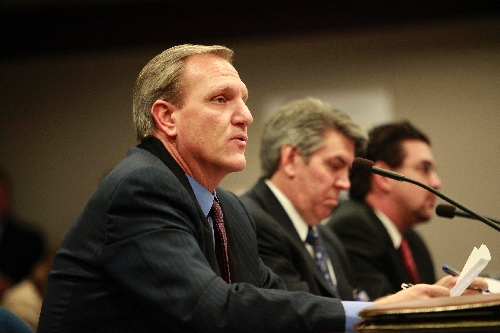Internet poker supporters point to tax dollars; opponents question legality

Despite the promises of jobs, increased tax dollars and the potential of technology businesses locating to Nevada, a lobbyist for the casino industry told lawmakers Thursday one important aspect would keep them from approving Internet poker in the Silver State.
Gambling on the Internet is illegal in the United States.
The Assembly Judiciary Committee heard almost two-and-a-half hours of testimony from supporters of Assembly Bill 258, which would allow the Nevada Gaming Commission to adopt regulations for Internet poker.
Opponents of the bill, namely lobbyist Pete Ernaut of R&R Partners who was representing the Nevada Resort Association, took only 30 minutes to lay out their arguments.
Ernaut expressed his belief that Internet gaming will eventually be legalized in some form. However, he also said the activity was illegal, even though federal prosecutors have never charged a gambler for wagering on the Internet.
"Lack of prosecution by the Department of Justice should not be interpreted as a lack of interest," Ernaut said.
Until the Unlawful Internet Gaming Enforcement Act, which made it a crime for banks and other financial institutions to process transactions used in online gaming, is reversed, there is no reason for Nevada to pursue Internet gaming.
Backing comments made previously by executives from casinos giants Caesars Entertainment Corp. and MGM Resorts International, Ernaut told lawmakers the federal government needs to legalize Internet gaming before states can weigh in.
"We want this industry to flourish," Ernaut said. "We want partnerships. We’re just asking you do it in the right order."
A Washington, D.C., attorney representing the Poker Players Alliance, which announced its support for AB258 before the hearing, disputed claims that the act’s passage in 2006 made the activity illegal.
The bill was introduced by Assemblyman William Horne, D-Las Vegas, the committee’s chairman. But he was also backed by a bevy of support, including former Assembly Speaker Richard Perkins, a lobbyist for Internet gaming giant PokerStars; former Gaming Control Board member Scott Scherer, who is now a gaming industry attorney; professional poker player Vanessa Rousso; and Tim Craine, economic director for the Isle of Man, the British dependency where PokerStars is licensed.
Craine told the committee the technology jobs brought to the Isle of Man by PokerStars and other Internet gaming companies had reduced unemployment to 2 percent.
In the last five years, Isle of Man has seen economic spending increase from $97 million to $268 million while taxes paid to the country increased from $4.8 million to $30 million.
"These figures are all related to e-gaming," Craine said.
The bill’s supporters also included Jeremy Aguero, a principal in Las Vegas financial consultant Applied Analysis. Aguero said the company studied what legalized Internet poker might mean to Nevada. He came up with several scenarios, including if online poker sites located in the state were able to accept wagers from U.S. residents outside Nevada.
One scenario could mean anywhere from $2 million to $3.4 million in new taxes to the state. Another scenario could bring Nevada anywhere from $37.1 million to $65.1 million. Additionally, online poker companies that locate headquarters in Nevada could provide anywhere from 1,180 to 1,900 jobs.
Perkins said that legalizing Internet poker would give Nevada’s casino industry a new income stream. He said Nevada needed to get out in front of other states in the legalization of Internet poker.
"All federal efforts have fallen short," Perkins said. "I understand a federal solution is better than a state-by-state solution, but other states could leap-frog us and take these jobs if we wait for the federal government."












